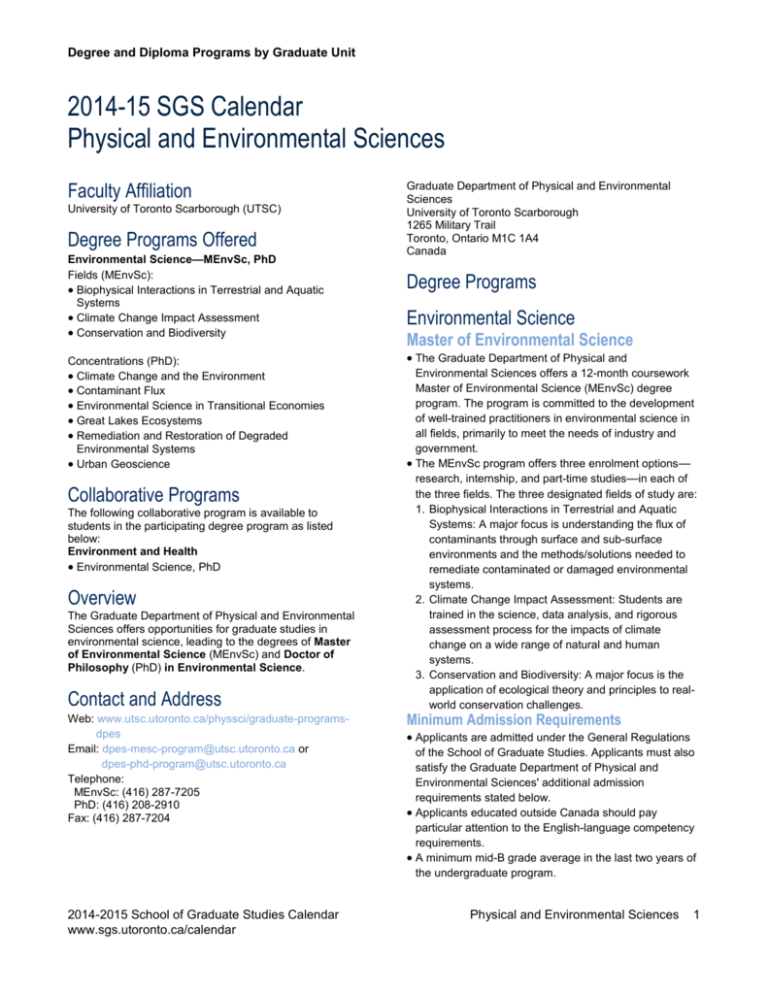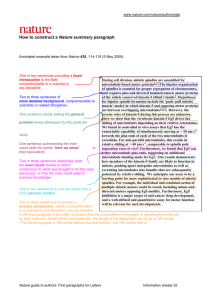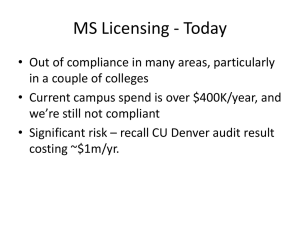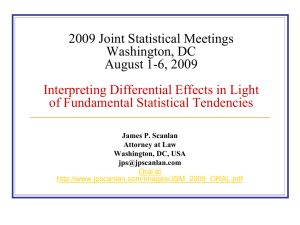Master of Environmental Science
advertisement

Degree and Diploma Programs by Graduate Unit 2014-15 SGS Calendar Physical and Environmental Sciences Faculty Affiliation University of Toronto Scarborough (UTSC) Degree Programs Offered Environmental Science—MEnvSc, PhD Fields (MEnvSc): Biophysical Interactions in Terrestrial and Aquatic Systems Climate Change Impact Assessment Conservation and Biodiversity Concentrations (PhD): Climate Change and the Environment Contaminant Flux Environmental Science in Transitional Economies Great Lakes Ecosystems Remediation and Restoration of Degraded Environmental Systems Urban Geoscience Collaborative Programs The following collaborative program is available to students in the participating degree program as listed below: Environment and Health Environmental Science, PhD Overview The Graduate Department of Physical and Environmental Sciences offers opportunities for graduate studies in environmental science, leading to the degrees of Master of Environmental Science (MEnvSc) and Doctor of Philosophy (PhD) in Environmental Science. Contact and Address Web: www.utsc.utoronto.ca/physsci/graduate-programsdpes Email: dpes-mesc-program@utsc.utoronto.ca or dpes-phd-program@utsc.utoronto.ca Telephone: MEnvSc: (416) 287-7205 PhD: (416) 208-2910 Fax: (416) 287-7204 2014-2015 School of Graduate Studies Calendar www.sgs.utoronto.ca/calendar Graduate Department of Physical and Environmental Sciences University of Toronto Scarborough 1265 Military Trail Toronto, Ontario M1C 1A4 Canada Degree Programs Environmental Science Master of Environmental Science The Graduate Department of Physical and Environmental Sciences offers a 12-month coursework Master of Environmental Science (MEnvSc) degree program. The program is committed to the development of well-trained practitioners in environmental science in all fields, primarily to meet the needs of industry and government. The MEnvSc program offers three enrolment options— research, internship, and part-time studies—in each of the three fields. The three designated fields of study are: 1. Biophysical Interactions in Terrestrial and Aquatic Systems: A major focus is understanding the flux of contaminants through surface and sub-surface environments and the methods/solutions needed to remediate contaminated or damaged environmental systems. 2. Climate Change Impact Assessment: Students are trained in the science, data analysis, and rigorous assessment process for the impacts of climate change on a wide range of natural and human systems. 3. Conservation and Biodiversity: A major focus is the application of ecological theory and principles to realworld conservation challenges. Minimum Admission Requirements Applicants are admitted under the General Regulations of the School of Graduate Studies. Applicants must also satisfy the Graduate Department of Physical and Environmental Sciences' additional admission requirements stated below. Applicants educated outside Canada should pay particular attention to the English-language competency requirements. A minimum mid-B grade average in the last two years of the undergraduate program. Physical and Environmental Sciences 1 Degree and Diploma Programs by Graduate Unit Applicants must submit a written statement explaining their objectives for entering the program and the suitability of their background. Appropriate post-graduate work experiences will be considered as part of the admission application. Additional admission requirements by field: Field: Biophysical Interactions in Terrestrial and Aquatic Systems A science or engineering undergraduate degree including at least two half courses or one full course in each of chemistry, physics, calculus, and biology. Field: Climate Change Impact Assessment A science or engineering undergraduate degree 1116Y), or 3.5 FCEs in elective courses (see course list) and 1.5 FCEs for the research paper (EES 1101Y). Students planning to complete the research paper option must complete the prerequisite (EES 1114H). Field: Climate Change Impact Assessment 5.5 FCEs total as follows: o EES 1100H Advanced Seminar in Environmental Science (0.5 FCE) o EES 1117H Climate Change Impact Assessment (0.5 FCE) o EES 1131H Applied Climatology (0.5 FCE) o EES 1132H Climate Data Analysis (0.5 FCE) o EES 1133H Climate Change Science and Modelling (0.5 FCE) including at least two half courses or one full course in each of chemistry, physics, calculus, and biology. o EES 1134H Climate Change Policy (0.5 FCE) o Completion of either 0.5 FCE in elective courses (see An undergraduate degree in biology or a closely related course list) and 2.0 FCEs for the internship (EES 1116Y), or 1.0 FCEs in elective courses (see course list) and 1.5 FCEs for the research paper (EES 1101Y). Field: Conservation and Biodiversity field. Program Requirements In all fields, coursework consists of 5.5 full-course equivalents (FCEs). Students will choose either a research or internship option. Research option: Each student is required to have a research supervisor. For full-time students, the intensive research necessary for the research paper will normally be completed in the final Summer session. The final research paper needs to be written in scientific journal format and will be presented and defended orally in front of an examination committee. The committee will include the supervisor and two other members of the graduate faculty. Internship option: For full-time students, the placement in private industry, government, or a non-governmental organization (NGO) will normally be completed in the final Summer session. It will consist of a minimum of four consecutive months. Successful completion of the internship is based on an assessment completed by the student's work supervisor and on an assessment of a written placement project report. A final grade below 70% in any course equates to an FZ, which is an insufficient grade. A MEnvSc student who receives more than one final grade of FZ (i.e., two or more) will be recommended for termination of registration from the MEnvSc program. Field: Biophysical Interactions in Terrestrial and Aquatic Systems 5.5 FCEs total as follows: o EES 1100H Advanced Seminar in Environmental Science (0.5 FCE) Field: Conservation and Biodiversity 5.5 FCEs total as follows: o EES 1100H Advanced Seminar in Environmental Science (0.5 FCE) o EES 3000H Applied Conservation Biology (0.5 FCE) o EES 3001H Professional Scientific Literacy (0.5 FCE) o EES 3002H Conservation Policy (0.5 FCE) o EES 3003H Topics in Applied Biodiversity (0.5 FCE) o Completion of either 1.0 FCE in elective courses (see course list) and 2.0 FCEs for the internship (EES 1116Y), or 1.5 FCEs in elective courses (see course list) and 1.5 FCEs for the research paper (EES 1101Y). Program Length 3 sessions full-time (typical registration sequence: F/W/S); 6 sessions part-time Time Limit 3 years full-time; 6 years part-time Course List Please note that not all courses are offered every year. EES 1100H Advanced Seminar in Environmental Science EES 1101Y Research Paper in Environmental Science EES 1102H Analytical Chemistry for Geoscientists EES 1103H Air and Water Quality Sampling and Monitoring EES 1104H Microorganisms and the Environment o Completion of either 3.0 FCEs in elective courses (see course list) and 2.0 FCEs for the internship (EES 2014-2015 School of Graduate Studies Calendar www.sgs.utoronto.ca/calendar EES 1105H Soil Contamination Chemistry Physical and Environmental Sciences 2 Degree and Diploma Programs by Graduate Unit EES 1106H Environmental Challenges in Urban Areas EES 1133H Climate Change Science and Modelling EES 1107H Remediation Methods EES 1134H Climate Change Policy EES 1108H Environmental Science Field Camp EES 1701H Environmental Legislation and Policy EES 1109H Advanced Techniques in Geographic Information Systems EES 1704H Environmental Risk Assessment EES 3000H Applied Conservation Biology EES 1110H Sediment and Contaminant Transport in Aquatic Systems EES 3001H Professional Scientific Literacy EES 1111H Freshwater Ecology and Biomonitoring EES 3002H Conservation Policy EES 1112H Boundary Layer Climates and Contaminant Fate EES 3003H Topics in Applied Biodiversity EES 3111H Conservation Genetics EES 1113H Groundwater Hydrochemistry and Contaminant Transport EES 3113H Topics in Population and Community Ecology EES 1114H Directed Readings in Environmental Science I EES 3114H EES 1115H Directed Readings in Environmental Science II EES 1116Y Internship EES 1117H Climate Change Impact Assessment EES 1118H Fundamentals of Ecological Modelling EES 1119H Quantitative Environmental Analysis EES 1120H The Dynamics of Contaminant Dispersal in Fluids EES 1121H Modelling the Fate of Organic Chemicals in the Environment Topics in Urban and Rural Ecology Doctor of Philosophy Research and teaching are focused on the interfaces between traditional disciplines in dealing with fundamental scientific issues. Faculty members are cross-appointed from several departments including physical sciences, biological sciences, engineering, forestry, and social sciences. Research is clustered into six major concentrations: 1. Climate Change and the Environment 2. Contaminant Flux 3. Environmental Science in Transitional Economies 4. Great Lakes Ecosystems 5. Remediation and Restoration of Degraded Environmental Systems 6. Urban Geoscience EES 1122H Global Environmental Security and Sustainable Development Minimum Admission Requirements EES 1123H Environmental Regulations of the School of Graduate Studies. Applicants must also satisfy the Graduate Department of Physical and Environmental Sciences' additional admission requirements stated below. Applicants may be accepted into the PhD program through one of three routes: 1. Following completion of the MEnvSc degree, an MSc degree in environmental science, or a related discipline, or the MASc degree in environmental engineering or related discipline, or equivalent from a recognized university with a minimum of B+ average in all work completed in the master's program. 2. By requesting transfer from a suitable master's program (see above); students may reclassify from the master's program after 12 months of full-time study. Transfer from the MEnvSc program is not permitted. EES 1124H Environmental Project Management EES 1125H Contaminated Site Remediation EES 1126H Environmental Tracers EES 1127H Geomicrobiology and Biogeochemistry EES 1128H Biophysical Interactions in Managed Environments EES 1129H Brownfields Redevelopment EES 1130H Ontario BioGeospheres Field Course EES 1131H Applied Climatology Applicants are admitted under the General Regulations EES 1132H Climate Data Analysis 2014-2015 School of Graduate Studies Calendar www.sgs.utoronto.ca/calendar Physical and Environmental Sciences 3 Degree and Diploma Programs by Graduate Unit 3. In the case of exceptional students, by direct entry; that is, after completing an honours BSc degree in a bachelor's program in a related discipline with a minimum University of Toronto average of A- or equivalent. Program Requirements A total of 2.0 full-course equivalents (FCEs) as follows: a mandatory 0.5 FCE (EES 2200H Advanced Seminar in Environmental Science) plus 1.5 FCEs from an approved course list in the graduate program. The courses are required to provide background for the student's research. Courses selected must be approved by the Graduate Chair. In some cases, additional courses may be required if a student's preparedness is assessed as being insufficient. o Students may apply to take a number of PhD-level courses taught by the core faculty both within the Graduate Department of Physical and Environmental Sciences and outside the Graduate Department of Physical and Environmental Sciences that can be considered for the PhD degree as part of their 1.5 FCEs credits for the degree. However, all courses for PhD degree credit must be approved by the Graduate Chair. The execution of an original piece of research in environmental science carried out under faculty supervision and presented in thesis form. The program requires the development and submission of a thesis proposal, and its examination in an oral thesis proposal appraisal (before the end of the second year), a departmental oral examination of the completed thesis, and a Doctoral Final Oral Examination carried out under the auspices of the School of Graduate Studies involving examination by an appropriate at-arms-length external examiner. o The PhD proposal appraisal consists of a 20-minute presentation given by the student on the proposed thesis work followed by a question period of approximately two hours. The emphasis will be on the theory and proposed approach, rather than on progress to date. A negative outcome requires that the student retake the exam within four months by considering suggestions offered by the committee for improving the thesis research proposal. The outcome of the second exam will be either a pass or withdrawal from the program. o The Graduate Department of Physical and Environmental Sciences' PhD program requires that all PhD candidates complete two thesis defences: a Departmental Thesis Defence and a Doctoral Final Oral Examination (FOE) with the School of Graduate Studies. Normally, the Departmental Thesis Defence will be held at least six to eight weeks prior to the 2014-2015 School of Graduate Studies Calendar www.sgs.utoronto.ca/calendar Doctoral FOE. The committee will notify the Graduate Chair that the thesis is ready to be forwarded to SGS for the Doctoral FOE. If the PhD candidate does not pass the Departmental Thesis Defence, the committee may recommend that the PhD candidate postpone their Doctoral FOE. The degree program has been designed so that it can be completed within: o four years for students who have completed a related master's degree o five years from the start of enrolment in their MSc program for students transferring from a master's program (excluding the MEnvSc) o five years for direct-entry students from a bachelor's program Program Length 4 years full-time; 5 years transfer-from-master's; 5 years direct-entry Time Limit 6 years full-time; 7 years transfer-from-master's; 7 years direct-entry Course List Core Course EES 2200H Advanced Seminar in Environmental Science The following are courses offered within the Department of Physical and Environmental Sciences. With the approval of the Graduate Chair, relevant courses from other graduate departments can be applied to the required 1.5 FCEs. Not all courses are offered every year. Elective Courses EES 1102H Analytical Chemistry for Geoscientists EES 1103H Air and Water Quality Sampling and Monitoring EES 1104H Microorganisms and the Environment EES 1105H Soil Contamination Chemistry EES 1106H Environmental Challenges in Urban Areas EES 1107H Remediation Methods EES 1109H Advanced Techniques in Geographic Information Systems EES 1110H Sediment and Contaminant Transport in Aquatic Systems EES 1111H Freshwater Ecology and Biomonitoring EES 1112H Boundary Layer Climates and Contaminant Fate Physical and Environmental Sciences 4 Degree and Diploma Programs by Graduate Unit EES 1113H Groundwater Hydrochemistry and Contaminant Transport EES 1117H Climate Change Impact Assessment EES 1118H Fundamentals of Ecological Modelling EES 1119H Quantitative Environmental Analysis EES 1120H The Dynamics of Contaminant Dispersal in Fluids EES 1121H Modeling the Fate of Organic Chemicals in the Environment EES 1122H Global Environmental Security and Sustainable Development EES 1126H Environmental Tracers EES 1127H Geomicrobiology and Biogeochemistry EES 1128H Biophysical Interactions in Managed Environments EES 1131H Applied Climatology EES 1132H Climate Data Analysis EES 1133H Climate Change Science and Modelling EES 1134H Climate Change Policy EES 2201H Advanced Readings in Environmental Science 2014-2015 School of Graduate Studies Calendar www.sgs.utoronto.ca/calendar Physical and Environmental Sciences 5





